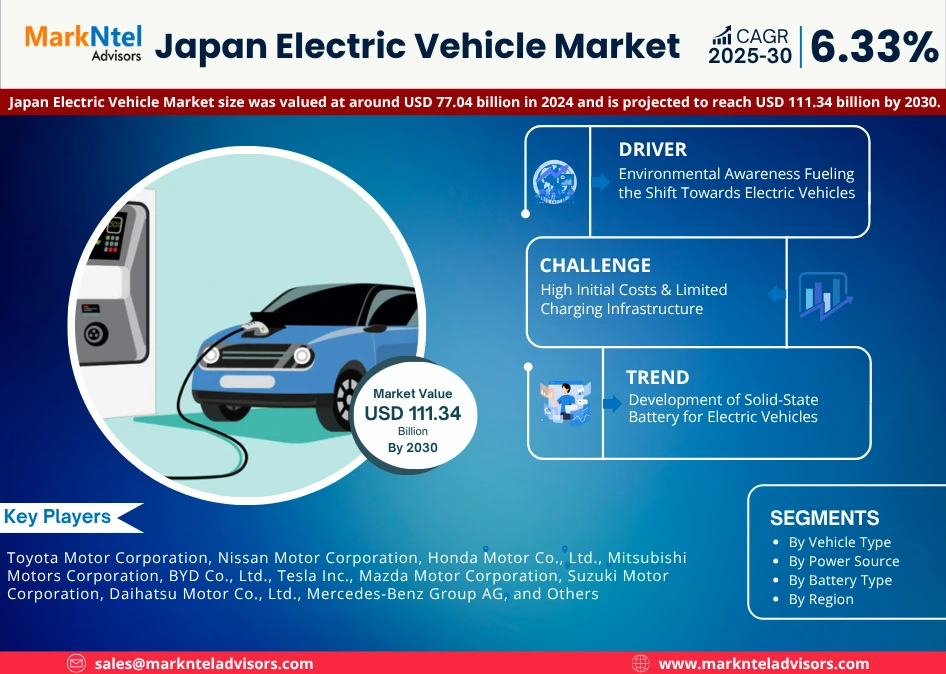Press Release Description
Japan Electric Vehicle Market to Reach USD 111.34 Billion Mark by 2030
The Japan Electric Vehicle Market size was valued at around USD 77.04 billion in 2024 and is projected to reach USD 111.34 billion by 2030. Along with this, the market is estimated to grow at a CAGR of around 6.33% during the forecast period, i.e., 2025-30, cites MarkNtel Advisors in the recent research report. Several growth factors of the Japanese Electric Vehicle Market include the release of harmful particles such as carbon dioxide, Sulphur & nitrogenous wastes from fuel-driven automobiles directly into the environment, the rising environmental issues due to the high prevalence of air pollution leading to the efforts to achieve sustainable goals, the incentives implemented by the Japanese government to motivate the citizens about utilizing electrified transportation over fuel-based ones, the technological innovations integrating advanced features in Electric Vehicles, rapid adoption of renewable energy resources, etc.
Additionally, continuous efforts by the country’s government to support the adoption of electric vehicles through various policies and investments are contributing to the market’s growth. Also, various other opportunities are there for this market, including a substantial amount of investments for the development and expansion of public charging stations and related infrastructure in Japan, thus marking a potential growth of the market. Moreover, the government has allocated a significant amount of investment for the expansion of lithium-ion battery production in the EV market of Japan, which is leading to the dominance of these lithium-ion-based battery EVs in Japan. Thus, the EV market in Japan is mainly driven by the lithium-ion battery production. Also, as per the vehicle type, passenger electric cars are leading Japan’s EV market due to high customer demand.
Furthermore, the Ministry of Economy, Trade, and Industry is the regulatory authority in Japan through which many automotive companies have got approval for the manufacturing of solid-state batteries for electric vehicles, which is more efficient, and provides high-energy density, etc. to the Electric vehicles, actively transforming the electric vehicle market in Japan. However, Japan’s Electric Vehicle market is facing challenges, including the limited stock of charging infrastructure in the country, instead of strong government support to increase the charging infrastructure. This is due to the rapidly increasing EV production and the slow development of charging points in the country, further states the research report, “Japan Electric Vehicle Market Analysis, 2025.”

Japan Electric Vehicle Market Segmentation Analysis
Hybrid Electric Vehicle (HEV) Holds the Largest Market Share
Based on the power source, the market is further bifurcated into Battery Electric Vehicle (BEV), Plug-In Hybrid Electric Vehicle (PHEV), and Hybrid Electric Vehicle (HEV). The Hybrid Electric Vehicle is dominating Japan’s Electric Vehicle Market, with a market share of more than 80%. The growth is driven by the strong demand for fuel-efficient vehicles by the customers, which has increased the requirement for Hybrid Electric Vehicles in the country. It led to the substantial manufacturing of hybrid EVs in Japan by the active key players such as Mitsubishi, Honda Motors, Toyota Motors, etc. These companies have launched a variety of new hybrid EV models, such as Prelude, Alphard, Crown Estate, CX-80 SUV, etc., in Japan. The launch of such types of models shows a great prevalence of hybrid Electric Vehicles in Japan, contributing to their dominance in this market.
Lithium-ion Battery is the Most Preferred Among End-Users
Lithium-ion battery holds the largest market share of over 60%. Japan is marked as one of the major producers of Lithium-ion batteries in the world, which is actively contributing to the market’s growth. Continuous developments in the automotive sector are leading to the expansion of lithium-ion battery manufacturing in the country. Consequently, the production units are rapidly expanding in the country under companies like Panasonic, Toshiba, Mitsubishi, etc. For instance, a company called GS Yuasa has substantially increased the supply of lithium-ion batteries to several companies such as Honda and Mitsubishi through a joint venture between Blue Energy Corporation and Lithium Energy Japan. Due to these factors, lithium-ion batteries are dominating Japan’s Electric Vehicle Market.
Competitive Landscape
With strategic initiatives, such as mergers, collaborations, and acquisitions, the leading market companies, including Toyota Motor Corporation, Nissan Motor Corporation, Honda Motor Co., Ltd., Mitsubishi Motors Corporation, BYD Co., Ltd., Tesla Inc., Mazda Motor Corporation, Suzuki Motor Corporation, Daihatsu Motor Co., Ltd., Mercedes-Benz Group AG, and Others are looking forward to strengthening their market positions.
Key Questions Answered in the Research Report
- What are the industry’s overall statistics or estimates (Overview, Size- By Value, Forecast Numbers, Segmentation, Shares)?
- What are the trends influencing the current scenario of the market?
- What key factors would propel and impede the industry across the country?
- How has the industry been evolving in terms of geography & product adoption?
- How has the competition been shaping up across the country?
- How has the buying behavior, customer inclination, and expectations from product manufacturers been evolving during 2020-30?
- Who are the key competitors, and what strategic partnerships or ventures are they coming up with to stay afloat during the projected time frame?
We offer flexible licensing options to cater to varying organizational needs. Choose the pricing pack that best suits your requirements:
Buy NowNeed Assistance?
WRITE AN EMAIL
sales@marknteladvisors.comCustomization Offered
100% Safe & Secure
Strongest encryption on the website to make your purchase safe and secure
